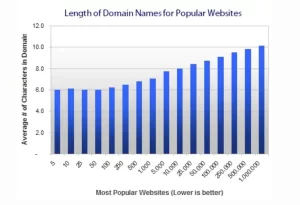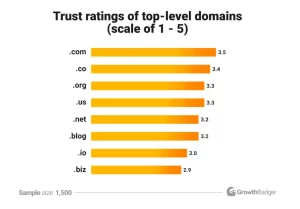Choosing an SEO-friendly domain name is one of the most important strategic choices when starting a digital venture. This blog post explores the nuances of domain SEO and offers helpful advice for creating a web identity that appeals to both users and search engines.
Related Article: Technical SEO Deep Dive: Enhancing Site Structure and Performance
Table of Contents
What is Domain SEO?
Domain SEO involves optimizing your website’s domain for improved visibility on search engines. This includes selecting a concise and relevant phrase, choosing a suitable subdomain, and picking an effective top-level domain (TLD).
Contrary to popular belief, domain SEO differs from webpage or URL SEO in the following ways:
- Webpage SEO: Involves optimizing digital web content, including copy, images, and associated buttons.
- URL SEO: Focuses on optimizing title tags, link anchor text, and elements of the actual web address.
- Domain SEO: Strives to optimize only the name of your registered domain.
Domain name SEO is a complementary strategy that works alongside other optimization efforts, including on-page, off-page, and technical approaches. Creating a polished domain name not only enhances its optimization but also helps the advancement of other SEO strategies.
Does Domain Name Matter for SEO?
A domain name’s length, keywords, and extension are vital in SEO. A reliable, focused, and straightforward domain name can attract more traffic and interest from users and search engines.
While some may underestimate the importance of domain names compared to other SEO factors, consider domains like www.cheap-discounted-electronics.com or freedeliveryforlife.biz. These examples lack credibility, potentially being perceived as dubious.
Customers and search engines are sensitive to this, underscoring the significance of selecting a reputable and relevant domain for effective SEO.
Working with an experienced SEO agency can provide useful insights in selecting your domain for optimal SEO.
Steps for Picking An SEO-Friendly Domain Name
Here are four practical suggestions for selecting a search engine-optimized domain name.
1. Choose the right keywords
The role of keywords in domain names has evolved. While explicit keywords were once crucial for search indexing, today’s domain SEO values a more concise approach.
A domain need not spell out keywords, but incorporating relevant concepts can enhance brand clarity.
Learn More: How to Find High-Potential Keywords for SEO?
2. Opt for a short domain name

The length of your domain name doesn’t influence its standing on search engines, especially on Google. However, it profoundly affects customer memorability.
Create a concise domain for enhanced user recall and potential alignment with Google’s user-centric ranking considerations.
Research indicates that the average domain length is 13 characters, and shorter names are more memorable. Creating a concise domain adds value and ensures easier recall.
3. Strive for domain name simplicity
Research indicates that simplicity in domain names significantly impacts performance:
- A 2% reduction in traffic for every character beyond the seventh.
- Simplified addresses without hyphens avoid traffic penalties.
- Repetition of vowel and consonant sounds corresponds to a lower rank.
Therefore, the more straightforward your domain name, the better its performance is likely to be.
4. Pick a trustworthy domain extension

The .com TLD stands out as the most popular extension globally, recognized for its trustworthiness and 33% higher memorability. While .com itself doesn’t boost search engine rankings, it instills trust in customers, enhancing organic visibility.
If a .com domain isn’t available, alternatives like .co, .us, and .net still garner trust. A study by Growth Badger advises caution with gTLDs released after 2015, like .frogans, .moda, .olayan, and other less familiar terms, as they may lack recognition in the marketplace.
Performing A Competitor Domain Name SEO Analysis
Before securing an SEO-friendly domain, assess your major competitors’ domains. Analyzing their positioning, ranking, and perception informs your decision-making. Here’s a simple approach:
- Evaluate if the domain is concise and brandable, ideally under 14 characters.
- Consider owning similar domains with various gTLDs to guard against imposters.
- Assess how authoritative the domain is and its alignment with the brand.
Gaining insights from competitors helps you choose a domain that surpasses theirs in keywords, phrases, gTLDs, and length.
Platforms like Moz.com can streamline this process, providing a comprehensive analysis of competitor metrics, including keywords and spam. It’s a valuable resource, especially when dealing with a large number of competitors.
How to Improve Your Domain Name SEO?
1. Create valuable content
Highly researched and informative content enhances authority, driving web traffic. Focus on SEO-friendly web pages and blog content, avoiding plagiarism or black-hat techniques for sustained content production.
2. Source domain backlinks
Backlinks from credible sources validate your brand’s authority and drive traffic. Become a niche authority through actionable content and collaborations. Avoid bulk links and prioritize organic strategies.
3. Elevate domain name branding
Your domain is a window into your brand. Optimize user signals by infusing your brand’s voice and tone. Strive for a balance between branding and keywords for a powerful online presence.
Do you have to change your domain name for SEO?
While domain names impact SEO, changing them can confuse search engines and harm web traffic.
Consider changing your domain name for SEO if:
- You’re undergoing a rebranding initiative.
- Implementing 301 redirects to preserve previous SEO efforts is part of your strategy.
- Your current domain is causing confusion or accessibility issues.
Changing your domain may impact returning visitors and search engine understanding, so proceed carefully to avoid confusion.
Final Thoughts on Domain SEO
In implementing domain SEO, remember that your domain is a digital identity, conveying your essence to visitors. Opt for short, memorable, and relevant phrases, aligning yourself with major brands. With dedicated effort, select an SEO-friendly domain for enduring benefits.


